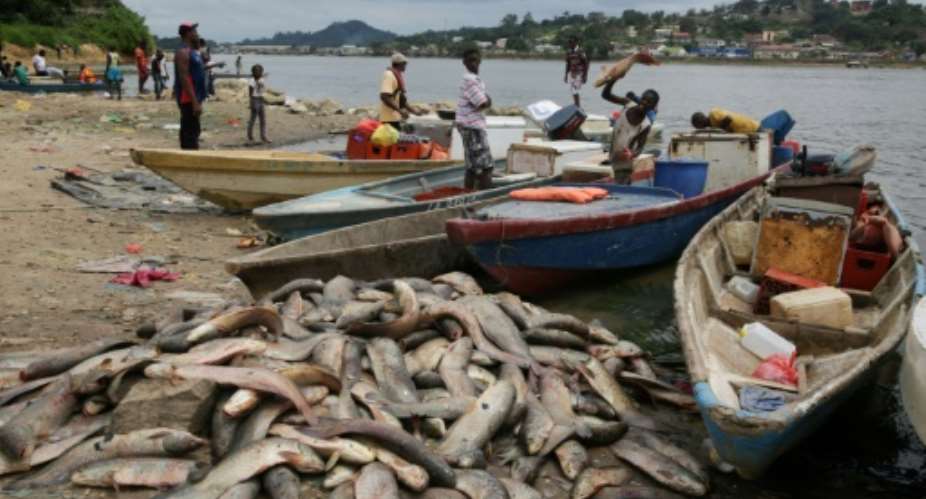For generations, carp have been intertwined with Lambarene, the village where Albert Schweitzer set up a hospital in the Gabonese rainforest.
The French-German doctor and philosopher famously had a pet pelican that he had saved, and fed the bird on the prized local fish.
But the alarm has sounded after a mass dieout of carp. In July, hundreds of the fish, a local staple, were spotted floating belly-up on the lakes of the Ogooue river.
The cause of death is not yet known. The finger of suspicion initially pointed at local fishermen for allegedly using unorthodox techniques, and at illegal miners working the banks of the Ogooue.
The government has imposed a ban until the end of August on fishing and trade in carp while investigations are carried out, to much anger and frustration.
"Poisoned carp? In Lambarene? It's nonsense," taxi driver Yvlain Magwala told tourists who had come to visit Schweitzer's renowned hospital and village complex.
"All this ban wants to do is kill the local economy," he said. "Why does this phenomenon only affect carp and no other species of fish?"
Authorities in Libreville have made no move so far to compensate residents of Lambarene, whose 40,000 people are hugely dependent on the carp trade.
When the fish began to wash up on the shores of the lakes, thrashing feebly and dying in the open air, locals at first could not believe their luck.
Men, women and children rushed to scoop up dead fish to cook or to sell, rousing the attention of a government agency and leading to tests of the lake water.
 A woman grills carp at a market, like many traders ignoring a ban on selling the fish in Lambarene. By STEVE JORDAN (AFP/File)
A woman grills carp at a market, like many traders ignoring a ban on selling the fish in Lambarene. By STEVE JORDAN (AFP/File)
Experts released early findings on Tuesday, noting "abnormally high" levels in the water and fish samples of a naturally-occurring bacterium called Aeromonas veronii.
"For the time being, no cases of sickness have been reported among people who have eaten carp, although we don't know the risks," said Daniel Franck Idiata, director of the National Centre for Scientific and Technological Research.
People eating the fish would have to be monitored to be sure they suffered no long-term consequences to their health, he said.
 Fish are left to dry at a wharf in Lambarene. By STEVE JORDAN (AFP)
Fish are left to dry at a wharf in Lambarene. By STEVE JORDAN (AFP)
Researchers are awaiting the results of analysis of biological samples sent to the University of Oslo in Norway.
Aeromonas veronii can cause acute diarrhoea if ingested in contaminated water or food, and infect wounds from exposure to contaminated water, say scientists. It is typically treated with antibiotics such as ciprofloxacin.
Regardless of the ban and any risk, carp was trading briskly when AFP visited the market while a nearby restaurant still touted carp soup on its menu.





 Supreme Court clears way for dual citizens to hold key public positions
Supreme Court clears way for dual citizens to hold key public positions
 Be transparent, don’t suppress the truth – Prof. Opoku-Agyemang to Jean Mensa
Be transparent, don’t suppress the truth – Prof. Opoku-Agyemang to Jean Mensa
 ‘I won’t tell the world I was only a driver’s mate during challenges’ – Prof Jan...
‘I won’t tell the world I was only a driver’s mate during challenges’ – Prof Jan...
 We’ll prosecute corrupt officials of Akufo-Addo’s govt – Prof Jane Naana
We’ll prosecute corrupt officials of Akufo-Addo’s govt – Prof Jane Naana
 [Full text] Acceptance speech by Prof Jane Naana Opoku-Agyemang as 2024 NDC Runn...
[Full text] Acceptance speech by Prof Jane Naana Opoku-Agyemang as 2024 NDC Runn...
 Election 2024: Don’t be complacent, we haven’t won yet – Asiedu Nketia cautions ...
Election 2024: Don’t be complacent, we haven’t won yet – Asiedu Nketia cautions ...
 Election 2024: Stop fighting over positions in Mahama’s next govt – Asiedu Nketi...
Election 2024: Stop fighting over positions in Mahama’s next govt – Asiedu Nketi...
 Prof Jane Naana Opoku-Agyemang will restore dignity of vice presidency – Fifi Kw...
Prof Jane Naana Opoku-Agyemang will restore dignity of vice presidency – Fifi Kw...
 'Ghana beyond aid' has turned out to be 'Ghana without compass' – Naana Opoku-Ag...
'Ghana beyond aid' has turned out to be 'Ghana without compass' – Naana Opoku-Ag...
 Nation builder Mahama will deliver on his promise of a 24-hour economy for the b...
Nation builder Mahama will deliver on his promise of a 24-hour economy for the b...
